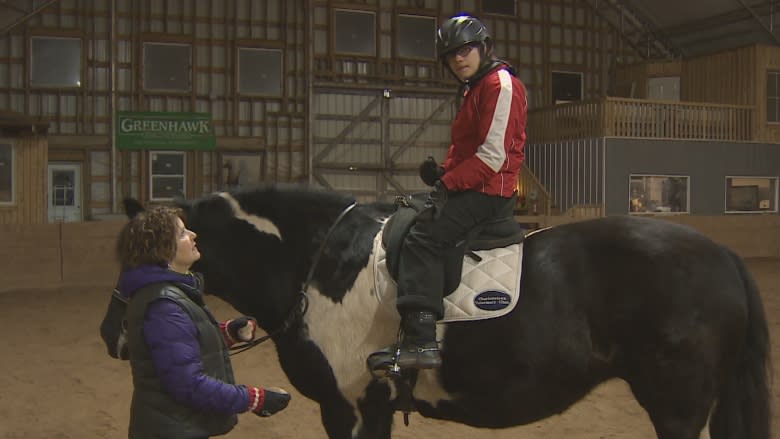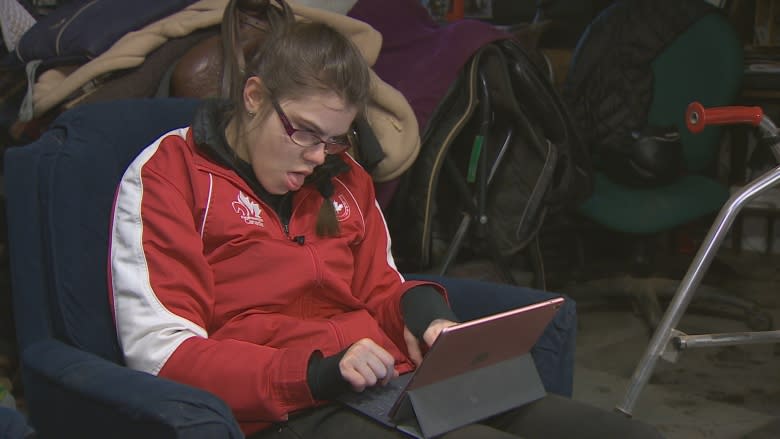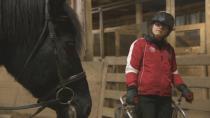Para-equestrian's delicate dance makes teen's disability 'disappear'
A young para-equestrian from Dartmouth is riding high after being declared eligible to compete for Canada at national competitions this year.
Nel Godin-Keating, 18, is training for another chance to represent her country at the North American Junior and Young Riders Championship in New York this July. She rode for Team Canada two years ago, earning two gold medals and one silver.
"I love riding horses because it keeps me strong and out of a wheelchair," said Godin-Keating, speaking with the help of a computer.
"Riding makes me feel strong, happy and proud."
Godin-Keating has cerebral palsy, a neurological disorder that limits her ability to speak and move independently. Most of her day-to-day life requires extra time and physical assistance, though none of that seems to discourage her.
1,100-pound, four-legged partner
Godin-Keating competes in para-dressage, in which athletes and horses perform a series of complex, predetermined movements from memory.
Watching for the first time, one might compare dressage to figure skating or ballet — but with a 1,100-pound, four-legged partner.
Dressage takes a level of precise control over a horse. To maintain it, Godin-Keating keeps a near-daily training schedule.
Disability 'disappears'
"The lifestyle is horses, riding, horses, riding," said Godin-Keating's mother and primary coach, Lorraine Godin-Keating.
"There isn't room for anything else. With Nel's disability in particular, it takes a lot of time."
Supporting a young athlete can be a hectic task for a parent, said Lorraine Godin-Keating, even at a recreational level. For parents of international competing athletes, it's often a full-time job.
Horses that compete in para-dressage can cost between $50,000 to $100,000 to train and buy, with another $30,000 to $50,000 spent annually on transport and competition fees.
Lorraine Godin-Keating said her daughter's disability "disappears" when she's riding, so it's worth every minute and every dollar.
"She doesn't see limitations. She wants to win and she's going to win.... I'm so proud of her. She's a bright light."
Financial obstacles
She said her daughter will continue to compete as long as the family can put together money for the expenses.
"There's only so much that you have in savings," said Lorraine Godin-Keating. "And we're chipping away at it. If we don't find some regular source of funding, we can't keep going to the higher levels."
Sponsorships usually don't become an option until athletes reach that higher level, said Lauren Barwick, a gold medal Paralympian and Canada senior para-equestrian. Barwick said she's "truly impressed" with Nel Godin-Keating's mastery of the dressage arena.
"She could be in the top-quarter of her class in the world," she said. "With the right horse, I think she could have a top-three finish."
The next step for Godin-Keating is to find a safe, healthy replacement for her aging competition horse. Her family and their supporters are fundraising online to lighten that expense, and in the meantime, she'll continue training for the North American competition.
"My goals are to get to the World Equestrian Games and the Paralympics," said Godin-Keating. "We are trying to find the right horse to try and get me up there."

 Yahoo Sports
Yahoo Sports 








